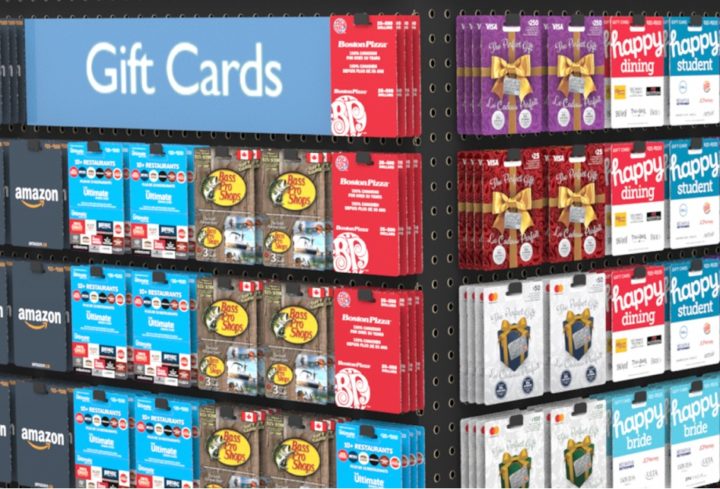If you use a $1 coupon on a $10 item, it’ll cost you $9. If you use a $1 gift card on a $10 item, it’ll still cost you $9. So does it really matter to you whether your discount is in the form of a coupon or a gift card?
Several companies are discovering that, to shoppers, gift cards are just as good as coupons – and to retailers and manufacturers, digital gift cards might be even better than digital coupons. The idea is that they’re more versatile, more secure and they help retailers avoid the whole complicated coupon settlement process.
PromotionPod is the latest out of the gate with “Fanfare,” a new digital gift card distribution platform that aims to replace the practice of handing or mailing out paper coupons. Say you’re in Target and there’s a sample station set up, with coupons available for the product. The pandemic has put a lot of sampling on pause, so Fanfare can help replicate the process digitally. Instead of sponsoring a sampling station in Target and handing out paper coupons, a brand can offer you electronic Fanfare credit via a unique link, redeemable for a Target e-gift card that you can apply toward the purchase of their product – all of which can be done on your phone.
The brand can choose a specific e-gift card, or give the recipient the choice of where they’d like to shop, from hundreds of options. The denomination can be set to offer the equivalent of a coupon discount, like a $1 gift card good toward the purchase of a recommended product, or it can be set to offer an amount equivalent to the full price of a product, allowing you to get it for free. Fanfare can be used in place of coupons, free product offers, or consumer rewards, redeemable just about anywhere. PromotionPod calls it a merger of e-gift cards and digital coupons.
Other incentives platforms have offered similar ideas. The company SKUx recently introduced “Smart Incentives,” which are product-specific mobile gift cards that can be applied to a purchase similar to the way you might use a mobile coupon. A retailer or brand can text or email you a link to a serialized, single-use gift card offering money toward the purchase of a product, or enough money to cover the full cost of the product.
Because the offers are recognized as payments when they’re scanned, and not as discounts like mobile coupons would be, SKUx says it’s “risk-free” for retailers and “virtually fraud-free.” So if, for example, you contact a company about a bad experience and they want to send you a coupon as an apology, they won’t have to take the risk of mailing you a paper coupon that can be copied, manipulated or abused. Instead, SKUx says they can send you a link to a customized Smart Incentive that’s coded like a coupon to be used on a specific product, but it’s scanned and accepted as a mobile gift card.
And that’s similar to an offering recently unveiled by TPG Rewards. Earlier this month, it officially announced “Barcode Bucks,” its own version of mobile gift cards that essentially act as mobile coupons. Unlike PromotionPod and SKUx, however, which are calling their offerings what they are, TPG Rewards is trying to apply some consumer-friendly shorthand in calling their offerings “coupons.”
TPG’s first publicly-announced use of its new incentives came in the form of free gum and candy samples offered by Mars Wrigley. Shoppers were asked to visit a website and enter their email address, and they’d be sent a link to a bar code redeemable at Walmart. The bar code is actually a mobile gift card that’s scanned at the checkout as a payment and not as a coupon, but to shoppers who get a discount no matter what you call it, it essentially serves the same function as a mobile coupon. So TPG is simply calling it a coupon in its marketing material, even though it’s technically not.
No matter what you call these incentives, they’re all a creative workaround for the fact that most retailers won’t accept a coupon displayed on a phone unless it’s from their own website or app. If a brand sends you a link to a mobile coupon redeemable for one of its products, good luck finding a store that will take it. Mobile gift cards are a different story – most retailers are already equipped to accept those. So there are major advantages to distributing a discount in the form of a gift card instead of a coupon.
The coupon industry has been working to create universal mobile coupons that all retailers will, in fact, accept. And SKUx and gift card processor Blackhawk Network have just announced an expanded partnership that will pave the way for more retailers to accept these universal mobile coupons that meet the standards set by the industry-based group The Coupon Bureau. Unlike paper coupons that can be used anywhere but are often misused, and unlike load-to-card digital coupons that are more secure but must be clipped and used at a specific retailer, The Coupon Bureau’s mobile coupons combine elements of both – the security of digital, with the universality of paper.
In the meantime, coupons are great but who doesn’t like free money? With a trio of companies offering easily-redeemable discounts in the form of digital gift cards, gift cards-as-coupons are becoming an increasingly popular way to offer convenient, secure savings right now, without having to wait until the industry perfects its new mobile coupon standards. Universal mobile coupons may catch on soon, but there will always be a place for gift cards. And for shoppers, whether you get a $1 coupon off a purchase or a $1 gift card redeemable on a purchase – as long as you get your savings, you’re free to call it whatever you’d like.
Image source: Blackhawk Network
















